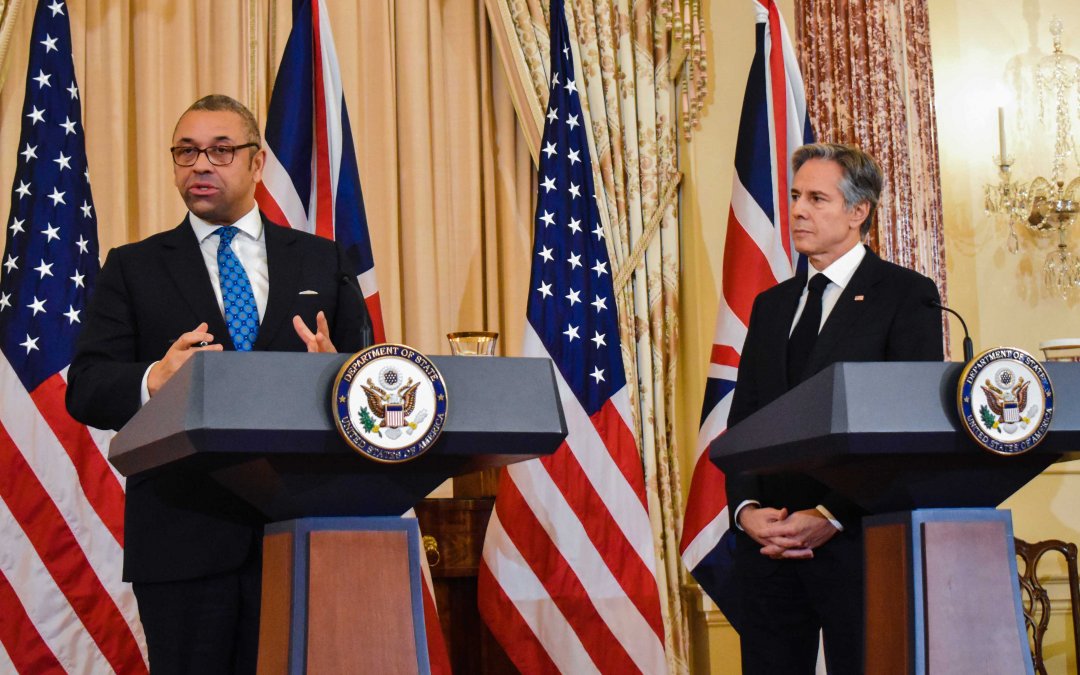WASHINGTON — U.K. Foreign Secretary James Cleverly and U.S. Secretary of State Antony Blinken reaffirmed their support for Ukraine in bilateral talks Tuesday.
In a joint press conference Tuesday afternoon, Blinken and Cleverly told reporters they discussed Russia’s recent missile strike on a residential building in Dnipro that killed at least 40 people this weekend, in addition to Iran, China, Northern Ireland and other topics.
“From the onset of this crisis, Britain and America have worked hand-in-glove to help our Ukrainian friends defend their homeland against Putin’s aggression,” Cleverly said, thanking the U.S. for its support. “Ukraine’s heroic armed forces have liberated thousands of square miles, and I have no doubt they can win in their battle for freedom.”
The visit comes two days after the U.K. doubled down on its longstanding support for Ukraine against the Russian invasion that began last February. On Sunday, U.K. Prime Minister Rishi Sunak committed to send Challenger 2 battle tanks to Ukraine in an extraordinary measure that few Western nations have been willing to take and that Blinken said the U.S. “applauded.”
Despite pressure from the U.K., the Biden administration has resisted calls to send its powerful Abrams tanks to Ukraine, even as it has recently agreed to send infantry fighting vehicles alongside Germany.
Dr. Schuyler Foerster, a scholar of NATO policy and former military officer and diplomat, said the unique relationship between the U.S. and the U.K. positions both countries to exercise significant influence over the war in Ukraine.
“It is not possible to overstate the importance of Britain and the United States together standing in support of security on the European continent, on which neither of them sit,” said Foerster.
Dr. Ray Raymond, an adjunct professor at the U.S. Military Academy at West Point and a former British diplomat, added that the U.K.’s steadfast support for Ukraine bolsters the potential for continued domestic support for military assistance in the U.S.
“European nations – Britain included – must pull the weight,” said Raymond, who co-authored a paper with Foerster on the U.S.-U.K. “special relationship” in 2017 for the Scowcroft Center’s Transatlantic Security Initiative at the Atlantic Council. “This is crucial to the American political effort, because any U.S administration has to be able to say that we’re not acting alone, that we have real European support behind us and they do.”
Foerster and Raymond explained that, while the U.K. has become more dependent on the U.S. since exiting the European Union, the relationship between the two countries remains unparalleled.
In a fireside conversation with CNN’s Kylie Atwood at the Center for Strategic and International Studies this morning, Cleverly emphasized that the war in Ukraine has implications beyond Europe.
“The importance of what we’re doing transcends Ukraine in itself,” Cleverly said at the event. “We’re defending the UN Charter. We’re defending the rule of law. We’re defending territorial integrity. We are defending the concept that the powerful cannot just do what they like on the world stage without consequences. This is what’s at stake. And those are things that are absolutely essential for us both – us all – to defend.”
Cleverly said the U.K.’s decision to send tanks to Ukraine sends a message to Russian President Vladimir Putin that the country is willing to provide Ukraine with the support it needs to defeat Russian forces.
While Cleverly declined to preview what future military support for Ukraine could look like, he noted that support has “evolved,” and will likely continue to do so. Cleverly pointed to the fact that sending tanks to Ukraine was not a possibility the U.K. was discussing last March.
Cleverly also would not predict how long he foresees the war lasting, but emphasized his belief that there is a moral imperative to bring the war to a conclusion promptly. He underscored that, even though the U.K. and its allies want to see the war ended as soon as possible, it must be resolved “properly and fully.”
“Properly and fully means that we don’t end up with a kind of protracted, stale conflict that then at some point in the future kind of heats up again and turns into another kinetic battle like we’re seeing at the moment,” he said. “We all have an incentive for this to come to a conclusion, for peace to be reestablished, and for that peace to be enduring.”
Cleverly and Blinken also took the opportunity to emphasize their partnership in opposing the current Iranian regime following its recent execution of British-Iranian citizen Alireza Akbari.
The execution of Akbari, a former deputy Iranian defense minister who was sentenced to death on espionage charges that he denied, comes as Iran’s regime has cracked down on unprecedented protests by increasing its use of death penalties.
“It fits a pattern of abuse by the regime: detentions, torture, forced confessions, unjust executions,” Blinken said of the execution. “We’ll continue to work with the United Kingdom and our other allies and partners to hold Iran’s leadership accountable for these and other abuses. We’ll keep standing with the brave Iranians who are standing up for their own basic rights led by young women – all of this in the face of extraordinary repression.”
Iran’s execution of Akbari has drawn strong condemnation from the U.K. – which has sanctioned Iran’s prosecutor general and temporarily recalled the British ambassador to Tehran – as well as its allies, including the U.S., France and Germany.
Blinken and Cleverly both emphasized the need to engage in diplomacy even with countries that act against their countries’ interests, including both China and Iran. Blinken said that while the Joint Comprehensive Plan of Action is not currently on the table, the U.S. continues to believe that diplomacy is the most effective avenue to enforce President Biden’s commitment that Iran never acquires nuclear weapons.

